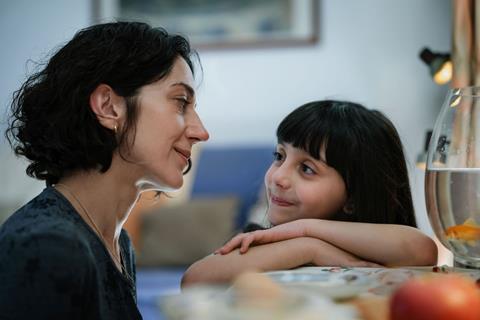BY TIM GRIERSON, SENIOR US CRITIC Screen Daily 20 JANUARY 2023
In Australia, an Iranian immigrant fights for her life and her daughter in Noora Niasari’s powerful, semi-autobiographical debut

SOURCE: SUNDANCE FILM FESTIVAL
‘SHAYDA’
Dir/scr: Noora Niasari. Australia. 2023. 117mins
Making her feature debut, writer-director Noora Niasari has crafted a gripping drama about one Iranian woman’s struggle to extricate herself from her husband — an ordeal that could also mean losing her daughter. Named for its weary but resilient protagonist, Shayda is inspired by Niasari’s own childhood and stars Zar Amir Ebrahimi as a mother hiding out in a women’s shelter in Australia as she attempts to remake her life and process the abuse she endured in her marriage. A palpable sense of dread hangs heavy over the film, the audience bracing for the inevitable moment that her domineering husband tries to separate her from her child.
Amir Ebrahimi gives a remarkable performance that’s a smart mixture of fiery and openhearted
Shayda premieres in Sundance’s World Cinema Dramatic Competition, its theatrical prospects bolstered by the presence of Amir Ebrahimi, who won Best Actress at last year’s Cannes for Holy Spider. Cate Blanchett serves as an executive producer, and strong reviews — not to mention the growing global awareness of the women’s rights movement in Iran — should help spark interest.
The story takes place in 1995, when Shayda (Amir Ebrahimi) is raising six-year-old Mona (Selina Zahednia), her loving, ebullient parenting style belying the anxiety underneath her warm smile. She has moved to Australia with her husband Hossein (Osamah Sami), but his abuse— including rape — has driven her to seek refuge in an undisclosed women’s shelter as she seeks to divorce him. But Hossein has been permitted visitation rights with Mona, and he fully intends to bring their daughter back with him to Iran.
Home movies of a young Niasari during the end credits signal the semi-autobiographical nature of the material: like Mona, the writer-director grew up in Australia after being born in Tehran. (Shayda is dedicated to “my mother and the brave women of Iran”.) And while the film isn’t quite a thriller, viewers will feel the lingering unease surrounding Shayda, who must contend with a nearly impossible set of circumstances. Refusing to let her husband know where she now lives, she grapples with the constant uncertainty of what might happen if the location of the women’s shelter is compromised. (The appearance of a mysterious car stationed outside the house is enough to make Shayda and the other residents nervous.) But there’s also Shayda’s thorny legal situation: as the bullying Hossein puts it, “You can’t stay here, get your divorce and keep the child.” Will Shayda have to choose between her freedom and Mona?
Amir Ebrahimi gives a remarkable performance that’s a smart mixture of fiery and openhearted. The film never lets us forget that although Shayda is mindful of the danger she faces from her violent husband, she isn’t willing to cower from life. After all, by rejecting customs like wearing a hijab, Shayda has already separated herself from an old existence she no longer desires. Shayda nicely balances the character’s understandable worry with a thirst to live — which includes the possibility of a new romantic relationship with sensitive, handsome Farhad (Mojean Aria), who is not aware that she is still married.
Occasionally, Shayda meets Hossein at a mall so he can pick up Mona, and Sami is convincing as this conniving husband, who schemes to turn his daughter against Shayda while trying to determine if his wife is dating anyone. But it’s not just Hossein applying pressure on Shayda: her own mother, still living in Iran, calls to tell Shayda to forgive him, insisting that’s he a good man. In the Iranian community in which she finds herself in Australia, Shayda encounters plenty of patriarchal attitudes about marriage – a tension that will come to a head near the film’s end when Hossein confronts her in public.
A story like this could lend itself to manipulative melodrama, but Niasari gives the material a pared-down simplicity, resisting big emotional twists or forced dramatic stakes. The muted approach only adds to the taut mood: Shayda is such a vivid presence that we keep fearing the moment when her resilient buoyancy may be destroyed by Hossein. But Shayda also takes time to focus on the offhand, happy moments between her and Mona, and newcomer Zahednia is endearing without being cutesy. (The child actor is especially effective once Mona starts to grasp her father’s cruelty.) Shayda is a tale of a woman who chooses hope over fear, which is all the more inspiring because the film shows us the many reasons why she should be afraid.